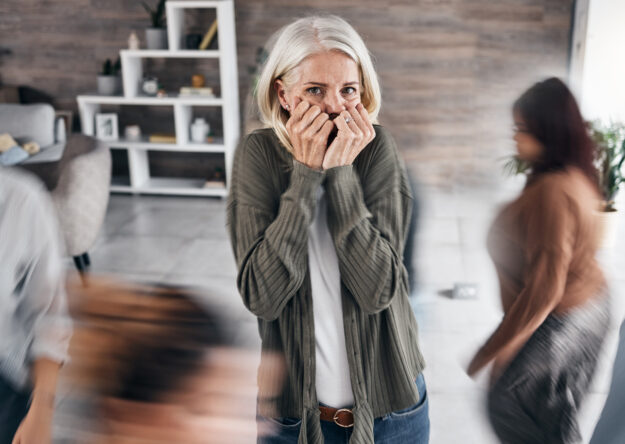Being around a big crowd can be exhausting, even when it’s people you know or like.

The noise, the energy, and the constant stimulation can pile up fast, especially if you’re more introverted, neurodivergent, or just burnt out. If you often feel overwhelmed by dealing with a bunch of people at once, you’re not alone. Here are some straightforward and relatively simple ways to help manage it and protect your energy while still showing up in a way that feels right for you.
1. Step away when you need to.

You don’t need a permission slip to take a breather. Whether it’s a bathroom break, a quiet walk, or just finding a hallway to stand in for a moment, giving yourself space is allowed. Stepping out can help reset your nervous system before it becomes too much.
Even a few minutes of quiet can make a big difference. It’s not rude to honour your limits—it’s respectful to both yourself and the people around you because it means you’re more likely to stay grounded instead of burning out mid-event.
2. Don’t feel pressured to perform.

You don’t need to be “on” just because there’s a crowd. Big groups can sometimes trigger the feeling that you have to be extra interesting, talkative, or socially switched on. But it’s okay to show up as you are, even if that means being quieter or just listening.
Often, the pressure to entertain comes from within, not from other people. Try reminding yourself that the people who matter aren’t judging how much you talk—they’re just glad you’re there. You’re allowed to exist in the space without performing.
3. Anchor yourself with one familiar face.

If there’s even one person you feel safe with, stick close to them. Having a familiar face nearby can reduce that feeling of being emotionally adrift in a sea of people. It gives you a small sense of control in an otherwise overwhelming space. That doesn’t mean you have to cling to them the whole time, but checking in now and then or starting conversations with them by your side can help the rest of the room feel less daunting.
4. Control what you can.

When you can’t control the size of the group, focus on what you can influence. This could mean wearing clothes that make you feel secure, choosing where you sit, or deciding in advance how long you’ll stay. These small choices build a sense of comfort. Knowing that you’ve given yourself some control, whether it’s over your exit strategy or your sensory environment, can take the edge off the stress of the unknown.
5. Arrive early, not late.

It might feel counterintuitive, but showing up early can be easier than walking into a room that’s already buzzing. You get to adjust gradually as the group builds, instead of being hit with a wall of energy all at once. Being there early also gives you first pick of where to sit or stand, which can help you feel more grounded and less thrown into the deep end socially.
6. Focus on small circles within the group.

You don’t have to engage with everyone. Finding or creating a smaller conversation inside the larger group can give you something to focus on, which helps cut through the feeling of being overwhelmed. Even chatting with just one or two people can provide enough connection without pushing you past your limits. Big crowds often break down into smaller pockets anyway—just go where it feels manageable.
7. Prep your nervous system beforehand.

If you know in advance that you’re heading into a big group situation, try doing something calming beforehand. This could be a walk, listening to a favourite playlist, or some deep breathing—whatever helps regulate you. You don’t need to arrive already tense and overstimulated. Starting from a calmer baseline gives you more emotional buffer when things ramp up later.
8. Don’t be afraid to leave early.

It’s not a failure to bow out before the end. Leaving early isn’t weak—it’s a strength to know when you’ve had enough and to respect that limit. There’s no rule that says you have to stay until the last drink or the final goodbye. If the situation is starting to drain you, leaving before you crash means you’ll recover faster and feel less resentful. It’s better to leave feeling proud of how you handled it than push through and end up burnt out.
9. Give yourself something to focus on.

Having a task or role—like helping in the kitchen, taking photos, or even just being the person in charge of the playlist—can give you a natural anchor. It takes the pressure off socialising nonstop and gives your mind a focus. This trick works especially well for people who get anxious in unstructured social situations. If you’re doing something with your hands or attention, it can quiet that sense of being aimless or on display.
10. Use grounding techniques during the event.

If the noise and stimulation start to get too much, use simple grounding tools. Feel your feet on the floor, take slow breaths, or quietly describe something you can see or hear. These help bring you back to the moment. Grounding isn’t about ignoring discomfort—it’s about giving your nervous system something steady to hold onto. The more you practise, the easier it gets to self-regulate in the middle of a busy space.
11. Lower your expectations.

Sometimes the pressure to be “fine” in group settings makes everything worse. It’s okay if you don’t love it. It’s okay if you find it awkward or exhausting. You’re allowed to show up imperfectly and leave with mixed feelings. Taking the pressure off makes the experience less intense. You don’t need to feel amazing the whole time for it to still count as progress. Just being there is enough.
12. Plan something quiet for after.
 Source: Unsplash
Source: Unsplash Knowing there’s something soft waiting for you at the end can make the whole event more bearable. It could be your favourite show, a cosy meal, or just sitting in bed with your phone off. Giving yourself something to look forward to helps regulate the emotional aftermath. Instead of crashing into emptiness, you land in something gentle and predictable.
13. Know that you’re not weird for feeling this way.
 Source: Unsplash
Source: Unsplash Some people genuinely enjoy big group settings—but many don’t, and that doesn’t make you antisocial, broken, or wrong. We all have different thresholds, and yours is just as valid as anyone else’s. Learning how to cope doesn’t mean forcing yourself to love it. It just means giving yourself tools to handle it better—so you can show up on your terms and leave with your energy intact.




